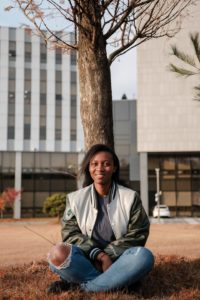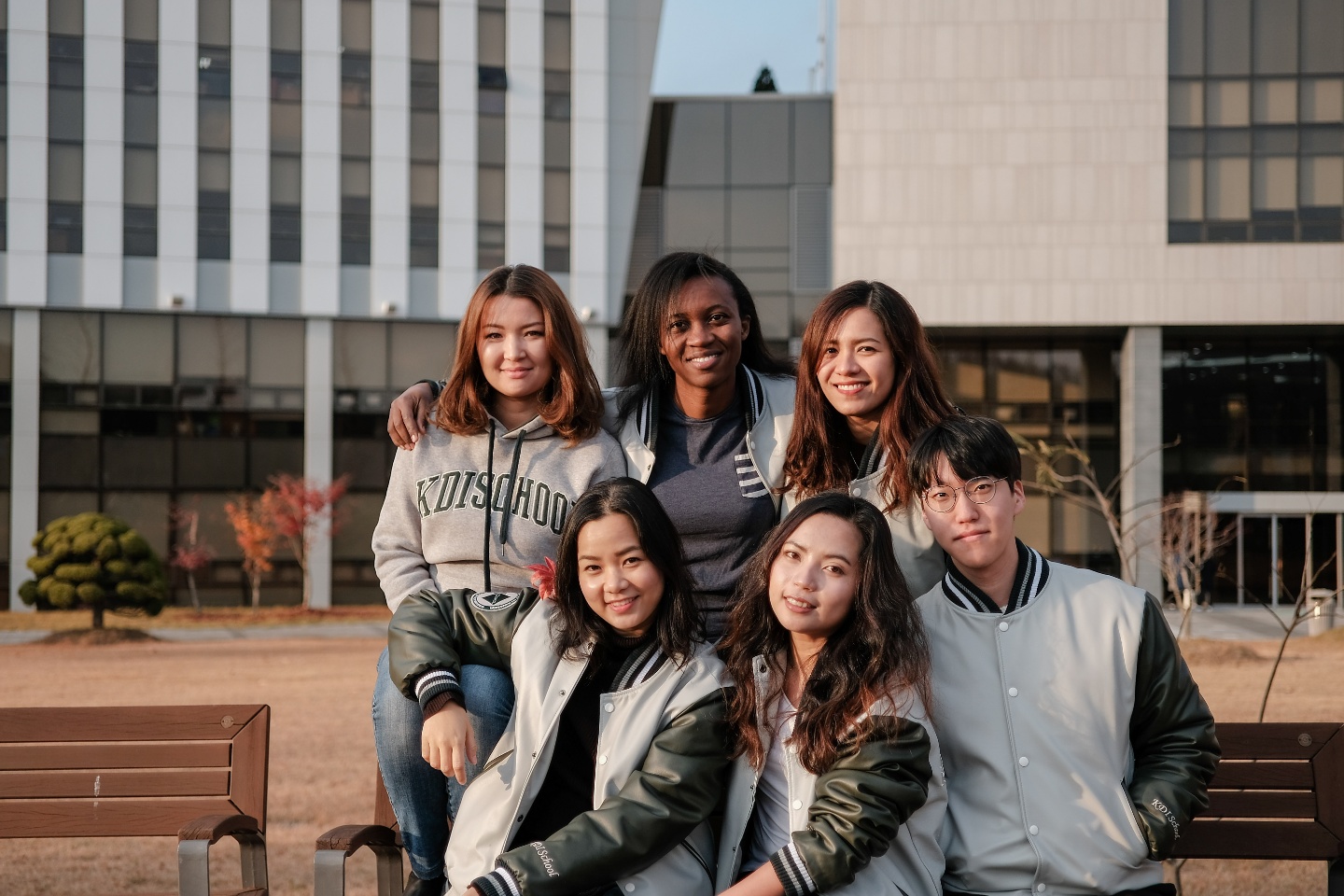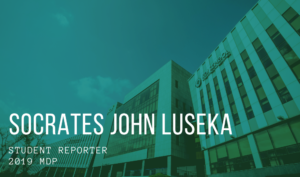
A Conversation with Ms. Mango Jane Angar (2018 MDP): Kenya
- Date 2021-09-02 06:39
- CategoryStory
- Hit2631

In 2017, Mango Jane Angar graduated at the top of her class and became the first foreign student to ever do so in Sookmyung Women’s University history. At KDI School, she continued to do well. 5 years on and Mango is still at it, this time preparing to leave her mark on an American university. She recently started her PhD at the University of California - Berkeley.
Mango, MDP (2018), is a proud KDI School alumna. Apart from being a dedicated student, she also served as the President of the African Development Forum as well as the Dormitory Assistant. We met and had the following conversation.
How would you describe yourself?
I am an academic and a Pan-Africanist. Well, my work and opinions tend to have this sort of Pan-Africanism underpinning. I find myself questioning how I ought to read or understand history or economics as an African, and it has really affected how I look at things. I am a socialist too, something that I’ve gravitated towards lately after undergoing an ideological evolution through the years.
How did you develop an interest in Political Science?
It started way back when I was young. I was interested in understanding how society works the way it does. More like the relationship between the governed and the governor, the state’s duty to its people and the role that people ought to take on to hold it accountable. This was definitely driven by what I saw around me growing up in Githurai, in Nairobi, Kenya. I would often wonder why there was poverty around me and not in some other places.
My instinct was told me that poverty existed because of bad governance, yet the citizens did little to hold the government accountable. As such it made sense to do Political Science and see if I could find solutions to challenges emanating from both ends. Looking back, it looks kind of messianic and narcissistic, which is not an appropriate approach when trying to find answers to problems, haha. I was literally trying to carry the country on my shoulders! Anyway, a girl can dream. (Laughs!)
I also chose to study in S. Korea because Korea’s model to poverty eradication seemed much more appealing than any other country’s model.
After finishing your undergraduate at Sookmyung Women’s university you then came to KDI School for your graduate studies. What motivated you to?
At Sookmyung, I would often ask professors to help me understand why Korea developed rapidly and most would advise that I pursue development economics later.
Coincidentally, in my final year, Prof. Man Cho (a veteran Professor at KDI School) visited Sookmyung to give a lecture. When talking about KDI School, he pointed to development economics as one of the school’s research areas. Funnily enough, when I asked him the very same question I used to ask Sookmyung professors, he was humble about it and admitted that he was also trying to find out. And that if I wanted to know, perhaps I should consider joining KDI School and join him in finding the answer.
His answer seduced me into applying and joining.
Alongside academics came extra-curricular activities and here you served as a Dormitory Assistant and as the President of the African Development Forum. How was the experience?
Working as a dormitory assistant was quite nice. I really enjoyed guiding the new students around, within their first few days at KDI School and in S. Korea. It was quite satisfactory getting to help others. I learnt a lot all through the experience.
As for leading the ADF, the experience was great too. I had a wonderful time with fellow Africans. That said, I also tried opening the forum to non-Africans. I didn’t want us to end up in an echo chamber given our shared similarities. Opinions from outsiders mattered too. Also, the world being a global village, it felt important for non-Africans to learn about Africa and vice versa, for effective multilateral relationships.
How did those experiences shape you?
Interacting and working with people from different countries shaped my people skills a great deal. I realized that as a leader, before you convince people to do or see things a certain way, you first have to start by seeing things the way they see them, especially when dealing with people from multiple cultures. I had to learn to take a step back and see things from other people’s points of view. Understanding people is key and being flexible enough to accommodate others is an invaluable tool.

How were you able to juggle schoolwork and leadership?
I look at education as more than just sitting in class. Meeting my DA responsibilities and leading the ADF was part and parcel of my education. Because I viewed it that way, I prioritized and made time for these duties.
Your outstanding academic record is quite admirable. How do you position yourself to do well?
Having a vision and being deliberate about it. From the very beginning, I had a plan on what kind of education I wanted (from undergraduate to PhD) and how that education was going to help me reach my vision. And recognizing how important education was for me to reach my vision was the reason why I worked hard in class and continue to.
I am always deliberate on what I want out of myself. At Sookmyung I told my friends I was going to graduate Summa Cum Laude, which was kind of crazy because all the classes were done in Korean. But I went all in and did it. Fast forward to KDI School, I approached Prof. Kim Booyuel (my then mentor) and told him what I wanted out of my master’s, from doing a quantitative thesis to positioning myself for a Ph.D. program in the US.
Scheduling and planning are a part of me. I plan to the tee. I usually make this year-long plan and then draw it down to a semester-long plan. I find it very important. And then there are obvious things like reading before you go to class, asking as many questions as you would during class, and then going through whatever you did in class later on.
What do you miss the most about KDI School?
The community. I had a diverse group of wonderful friends. From the Korean public servant in Jeju City, to the lady working at the Central Bank of Thailand, the lady from the Ministry of Commerce in Cambodia to the guy working at the Ministry of Foreign Affairs, Congo, the list goes on. The diversity was rich. We met, connected, and never got tired talking to each other. Everyone was interesting, genuine, and loving.
I miss professors too. I miss classes by Professor Wang Shun (my supervisor) and Prof. Kim Booyuel (now at SNU). I have to thank Professor Inbok Rhee for guiding me through my Ph.D. application process even though he was not a faculty member when I was around.
Could share your PhD application experience and advice to would-be applicants?
Most applications open in September but in all honesty you ought to start preparing in January. That’s what I did. You may start by doing the GRE test and TOEFL, and later research the kind of schools to apply to. Once you choose the schools you want, you might want to check out the professors and their departments.
Depending on where you want to end up, try tailoring your experience and education to fit their requirements. The statement of purpose, personal statement, and letters of recommendation are very important, so you really need to take your time when preparing them. And try to seek help from professors and those who’ve gone ahead of you.
I applied to UC Berkley, London School of Economics (LSE), MIT, Cornell University, and the University of Michigan. I sought a lot of help from Professor Inbok Rhee (he’s also a political scientist) throughout my application process. Other than that, I wrote around 32 drafts of my statement of purpose before the final draft, prepared my writing sample (I used my thesis), and then deliberately looked out for professors to recommend me. Something that I’d advise others to do to avoid plain recommendation letters.

Thank God, I was accepted into UC Berkley, London School of Economics (LSE), Cornell University, the University of Michigan and was 1st on MIT’s waiting list. I ended up settling for UC Berkley.
What are you studying at UC Berkley?
My major is still Political Science. I aim to explore the implications of electoral violence on political accountability, the effects of electoral violence on the long-term welfare of historically marginalized communities and the effectiveness of institutional reforms on mitigating the occurrence of electoral violence, all this within the context of East Africa.
Any parting shot or word of advice?
One thing I used to fear the most was failure. The more I did well, the more scared I was of failure, because it felt like the fall was going to be severe. And so, at some point I stopped taking risks. Fast forward, I would come to realize that once you stop taking risks, you minimize your chances of failure and in turn your capacity to grow. But what is the point of anything if there is no growth? If you deprive yourself the opportunity to fail, you are doing yourself a huge disservice.
-----------------------------------------------------------------------------------------------

